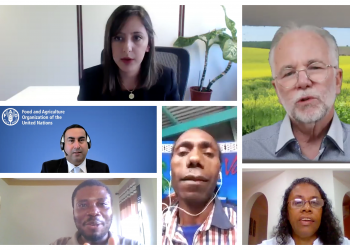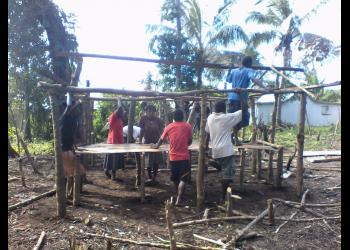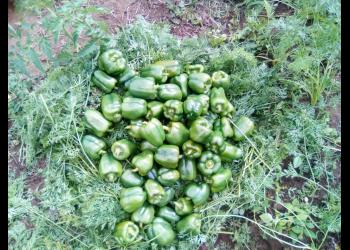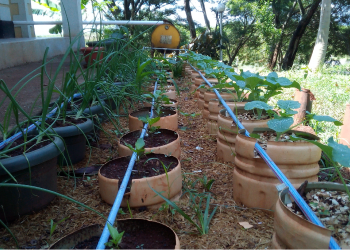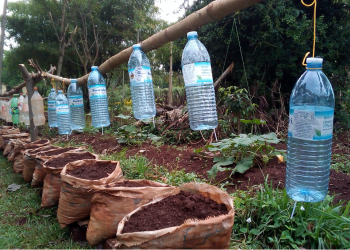Top UN organizations discuss food security with BIC and grassroots actors at Social Forum
As the global pandemic continues, concerns have arisen regarding increased hunger and food security among the world’s most vulnerable populations. During the recent United Nations (UN) Social Forum, an annual event focused on global developmental challenges, the Baha’i International Community’s UN Office in Geneva gathered experts from the United Nations Development Programme (UNDP), the Food and Agricultural Organization of the United Nations (FAO), along with grassroots actors from Colombia, Uganda and Vanuatu, to consider local responses to the global challenge of food insecurity.
The event, titled Global to Local: The Role of Communities in Strengthening Food Systems, asked global officials and local activists to reflect on the role of communities in responding to the food security challenge in a way that benefits all.
Simin Fahandej, Representative of the Baha’i International Community to the United Nations in Geneva, who moderated the event, reminded attendees that “if food were to be distributed equally, there would be enough to feed the entire global population”. A comprehensive solution to this issue requires “transformative changes to the current systems, structures and approaches at every level of society.” In global economic and agricultural structures, she added, local communities have a key role to play in fostering community resilience.
“What is the role of local communities and also policymakers in fostering local resilience and self-sufficiency? How can efforts be focused on strengthening communities themselves to contribute to their own well-being, especially during times of crisis, such as the current pandemic?” she asked.
One of the panelists, Gary Reusche, a senior official at UNDP and an expert in food security, spoke of the importance of a move towards community-led programs and strategies to address hunger. Speaking of the desire of local communities to have local access to food, he shared approaches where production and marketing are “done in the local community, for the local community and contributing to the local community”. This is an issue that is becoming “very important to a lot of countries around the world.”
Reusche also discussed the challenge faced by small farmers who are “outside the system” and often unable to secure loans or sell in regulated markets. Opening agriculture to communities requires “another kind of paradigm,” Reusche said, where “solidarity and development within the community” create new relationships between farmers and local inhabitants.
Similarly, Ahmad Mokhtar, a representative and economist from the Food and Agricultural Organization of the United Nations stated that one of the reasons that food is not distributed equitably is that, “in addition to many structural imbalances...not every country can produce locally...due to resource endowments imbalances.”
Mokhtar added that the recent crisis has “given much more impetus to think about how we can develop [food security solutions] at the local levels”. He elaborated on the socio-economic, environmental, and health advantages of this approach, such as reducing carbon footprints through the reduction of supply chains and producing food “much more geared towards that population”. Strengthening national institutions, he added, was an important means to reinforce local-level projects.
“What could be better [than having] self-sufficient local food systems that would empower the populations and make the societies resilient, to reduce poverty and inequality?” asked Mokhtar.
Grassroots actors from Colombia, Uganda and Vanuatu joined the discussion as well, sharing experiences in building local food systems and fostering resilience in their communities during a pandemic that is affecting the availability and accessibility of food.
María Cristina Mosquera, Director of the Food Production Initiative at the Fundación para la Aplicación y Enseñanza de las Ciencias (FUNDAEC), spoke of that organization’s response in a country where 70% of workers are engaged in the informal economy.
Drawing on decades of experience working with local populations, FUNDAEC focused on four areas of local food production: the creation of home gardens, the cultivation of more extensive agricultural plots, improved food processing, and the distribution and marketing of food.
Colombia “is the most unequal country in Latin America, in terms of land distribution,” explained Mosquera, adding that this inequality in land ownership and use is widely seen as one of the main triggers for the country’s five decades of armed conflict. The pandemic has further caused at least 10 million people to lose formal and informal sources of income.
As a result of the initiatives which began in March, more than 1,700 people linked to FUNDAEC have started almost 900 agricultural projects. But the crucial value comes from the multiplying effect of empowerment, said Mosquera. Twenty people in the local community of Aipe, for example, established a collective garden, but their harvest was distributed to 74 separate families. These families themselves are then invited to plant their own food, further multiplying benefits.
“In terms of community participation,” Masquera explains “people are motivated to make their experience like a magnet that is able to attract and unite a group of friends who can channel their collective efforts into a common cause, realizing how, just as plants grow, so do the bonds of friendship, and their abilities as individuals and as a community.”
This pattern of empowering local communities is also central to efforts in Uganda, shared by Kalenga Masaido, coordinator of the Agriculture section of the Kimanya-Ngeyo Foundation for Science and Education. “One of the many questions that the organization has in front of it,” Masaido explains “is how do we help communities to take ownership of their own development?”
Like Colombia, Uganda faces land shortage problems. Most is owned by big corporations, leaving only small plots for individuals. Masaido said that Kimanya-Ngeyo started its engagement with food security by going into villages, gathering together individuals who had not had the opportunity to continue their education, engaging them in a programme of study of concepts concerning individual and community development, reflecting and consulting on the needs of local populations, and then acting on what was learned. Discussing the needs of a community with its members is a key part of this process.
Explaining that while many development efforts focus primarily on questions of distribution, Kimanya-Ngeyo tries to take a wider perspective. “The big question is, how do we regard each and every individual in the world as a mine rich in gems of inestimable value?” Masaido remarks. “Even someone down deep in the village of Africa, they have the capacity to get out of poverty, to get food.”
Kimanya-Ngeyo has been working with communities to explore how a family or a community can use small plots of land efficiently in order to sustain itself using different crops. Villages where the organization has been active have thus found novel solutions to longstanding problems—land shortages, water access challenges, livestock feed problems—often at the level of the family. Spare areas outside residential properties have been turned into agricultural plots hosting a variety of crops, making local community members active agents in meeting their own food needs as well as those of their neighbourhoods.
Communities empowered to contribute to their own development are also more resilient to crises and outside shocks. This was a theme emphasized by John Siri, who works with the Foundation for the Betterment of Society, a non-governmental organization which has launched a programme called Preparation for Social Action (PSA) in Vanuatu. PSA raises capacity in young people to integrate knowledge from various fields, such as agriculture, health, and environment, to address local challenges. The programme has been implemented in 17 countries globally.
Siri said that in Vanuatu “most of the population is engaged in primary [food] production”. But while the wide distribution of agricultural work has helped make Vanuatu’s society resilient to recurring shocks, recent changes in farming, as well as social changes such as a rising population, have eroded that capacity.
Through the PSA programme, the organization is helping train individuals and communities to find better ways to protect seedlings from volcanic ashfall and to plant during the off-season. Building greenhouses, for example, has allowed communities to protect their seedlings from heavy rain and volcanic ashfall before transplanting them into farms.
Food aid distributed by the government and other groups can help meet immediate needs in certain situations, Siri said, but can also have the unintended effect of weakening traditional bonds. The population becomes “disempowered” and “dependency is created”, Siri said, and some have come to think “only about their own good … forgetting the wellbeing of their community.”
The role of communities in addressing the challenge of food security was an important part of discussions throughout the Forum.
“The majority of people suffering from hunger and malnutrition are living in agricultural zones, rural areas,” said Ana Maria Suarez Franco, the Permanent Representative of FIAN International, an organization working on food security globally, in another panel event. This is while family- and community-level rural farming “produce between 70 and 80 percent of the supplies of healthy food around the world.
“The guiding principles of extreme poverty and human rights recognize the link between nutrition and achieving other rights…. When people suffer from malnutrition, communities suffer from conflict and peace is threatened.
“What we need are structural changes which recognise the social drivers of hunger,” she said.
